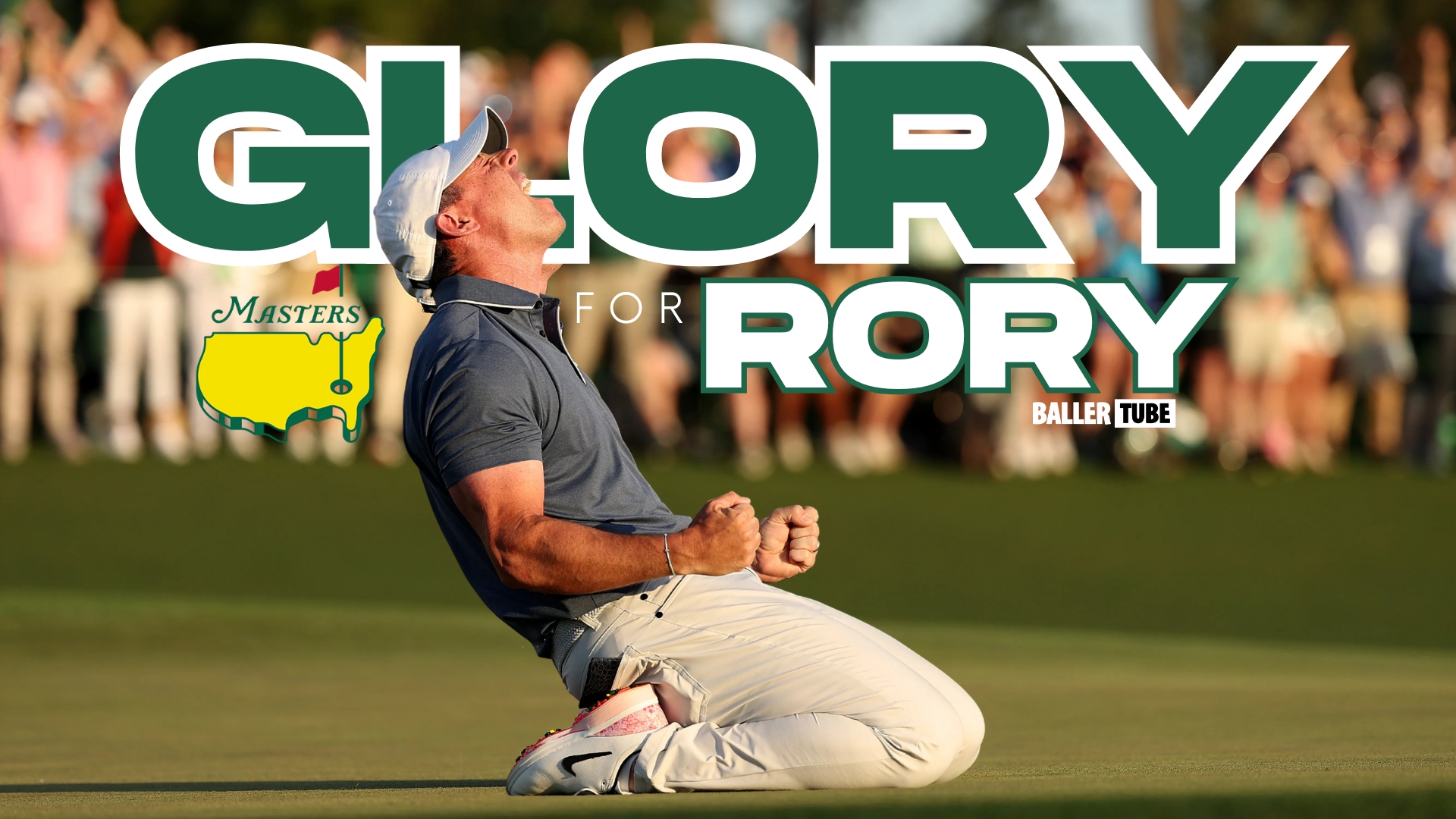AUGUSTA, Ga. —
The sun was just beginning to dip behind the towering loblolly pines of Augusta National when Rory McIlroy stood alone on the 18th green, right arm raised, eyes glossy with the weight of history, relief, and something deeper — redemption. The crowd around him rose to its feet, not in the roar of surprise, but in the knowing exhale of a moment they had long been waiting to share with him.
It took 14 years, 15 tries, countless collapses, and one of the most dramatic sudden-death finishes in Masters history, but at last, McIlroy has donned the green jacket.
With that, he enters the sport’s most exclusive club: a career Grand Slam winner.
The Final Hurdle
There was always something different about Augusta National when Rory McIlroy arrived. Something quieter, heavier. He would downplay it in pressers, flash the easy grin, joke with reporters, talk about rhythm, about "letting the course come to him." But the shadows of 2011 always lurked.
That year, at just 21, he held a four-shot lead heading into Sunday and collapsed with a harrowing 80 — a disaster that’s haunted every return since. While his contemporaries claimed titles and moments, Rory kept returning to Augusta as the heir apparent who never quite inherited the crown.
Until now.
“I’ve waited for this moment for so long,” McIlroy said, his voice breaking post-round. “And the longer you wait, the more you wonder if it’s ever coming. Today… it finally did.”
A Battle Built for Legend
This year’s tournament will be remembered not only for McIlroy’s triumph, but for the grueling path he had to walk to get there. After shooting an opening-round 69 that kept him just a few shots back, McIlroy surged on Saturday, posting a 67 that saw him enter Sunday’s final round tied atop the leaderboard with Collin Morikawa, the two-time major winner known for his unflappable iron play.
The final round was a duel in every sense of the word.
Hole after hole, McIlroy and Morikawa matched each other — birdie for birdie, par for par — trading leads in a delicate balance of risk and restraint. Neither blinked. At least, not until the playoff.
It came down to 18 once again, after McIlroy buried a clutch birdie putt in regulation from 14 feet to tie Morikawa at -12. The playoff was tense, clinical. Morikawa pulled his tee shot left into the second cut, forcing a conservative approach. McIlroy stepped up with that trademark swing — a blend of athleticism and poetry — and landed his second shot just inside 20 feet.
Two putts later, it was over.
The Weight of What Could’ve Been
For McIlroy, this wasn’t just the final jewel in a glittering crown — it was the closure of a chapter that nearly defined him. He’s long been regarded as the most talented player of his generation, perhaps the most gifted since Tiger Woods, but the Masters was the thorn that kept poking at his resume, the "yeah, but…" in every conversation about his legacy.
He won the U.S. Open in 2011 by eight shots, The Open in 2014 at Hoylake, and two PGA Championships. But every April, as azaleas bloomed and hope returned, Augusta took more than it gave. In 2022, his final-round 64 electrified the course but left him just short. In 2023, he missed the cut. The following year? Another disappointment.
He became golf’s most compelling paradox — both a legend and a question mark.
Now, the question has been answered.
A Legacy Rewritten
With this win, Rory McIlroy becomes only the sixth golfer in history to complete the modern career Grand Slam, joining the pantheon of Gene Sarazen, Ben Hogan, Gary Player, Jack Nicklaus, and Tiger Woods.
But his journey to that elite company might be the most tumultuous. None of the others had to wait over a decade between their third and fourth majors. None had to publicly wrestle with their own doubt the way McIlroy did.
"He’s always carried the sport on his shoulders," said former PGA Tour commissioner Jay Monahan. “Even when he wasn’t winning, Rory was the one people followed. He was the soul of the game. This changes everything — for him and for golf.”
More Than a Champion — A Symbol
In recent years, McIlroy’s role in golf extended far beyond the scorecard. When the LIV Golf controversy fractured the sport, McIlroy became its most vocal defender. While other stars took guaranteed money, McIlroy doubled down on tradition, on values, on legacy.
That decision cost him — in earnings, energy, and support. But it also elevated him into a figure of principle.
“I know what I believe in,” he told reporters last year. “And I believe the majors are the measure.”
In winning the Masters, he hasn’t just completed a Slam. He’s reinforced his vision of what golf should be — and what greatness still means.
The Emotional Toll
The outpouring after the win was immediate and emotional. Golf legends from Jack Nicklaus to Tiger Woods tweeted their congratulations. A tearful hug from wife Erica and daughter Poppy near Butler Cabin reminded fans that behind the legend is a man who’s grown up — not just in age, but in public, in pressure, in pursuit.
Gone is the boyish phenom with floppy curls and wild power. In his place is a seasoned, battle-scarred champion, one who’s fought the weight of expectation and — finally — emerged on the other side.
“You never know when your moment is coming,” McIlroy said. “But I never stopped chasing it.”
The world applauds. #themasters pic.twitter.com/pb5eXUx51m
— The Masters (@TheMasters) April 14, 2025
The Game's Future — And McIlroy’s Place In It
Golf is entering a new era — a fractured, globalized, digitized one. Yet in Rory McIlroy, the sport now has something rare: a unifying figure who bridges generations.
He’s the man who walked in Tiger’s shadow and never ran from it. The one who gave the game a conscience when it needed one. And now, finally, he’s the man who conquered Augusta.
“Everything changes with this win,” said ESPN analyst Michael Collins. “Now we’re not talking about potential. We’re talking about completion.”
Key Stats and Fast Facts:
| Fact | Rory McIlroy’s Masters Win |
|---|---|
| Final Score | -12 (274) |
| Winning Margin | Playoff victory over Collin Morikawa |
| Age | 35 |
| Career Major Wins | 5 (U.S. Open 2011, PGA 2012 & 2014, The Open 2014, Masters 2025) |
| Grand Slam Status | Completed |
| Augusta Appearances | 15 |
| First Major Win | 2011 U.S. Open |
A Victory Beyond Sport
McIlroy’s win is more than a headline — it’s a story of persistence, identity, and the emotional cost of greatness. It’s about a man who grew up in the public eye, stumbled, and kept getting back up. And it's about a game that, despite its politics and fractures, still knows how to deliver poetry.
-
Rory McIlroy has won the 2025 Masters after 14 previous attempts.
-
He is now the sixth player to achieve the career Grand Slam.
-
His win came after a playoff against Collin Morikawa.
-
McIlroy’s emotional victory redefines his legacy and solidifies his place among golf’s all-time greats.
-
The win also echoes larger themes in golf — loyalty, tradition, and redemption.























